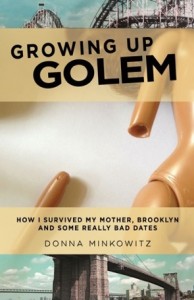
W.Y.S.M.: Sheila Alexander-Reid
January 21, 2014
Capital Pride Reveal 2014
January 22, 2014How a lesbian survived her mother, Brooklyn, and some really bad dates
In true Jungian fashion, Growing Up Golem colors an introspective memoir with the myth of an anthropomorphic being brought to life to fulfill the wishes of her master. Donna Minkowitz examines the inner workings of her own psychology, illuminating the struggle of discovering one’s voice despite her overbearing, mercurial mother and her various demands.
 Beginning in early childhood, her mother is emotionally abusive, treating Minkowitz as the “favorite” child while also breaching healthy boundaries between mother and daughter. Because of this corrupt relationship, Minkowitz, throughout her life consistently sacrifices her own desires in order to satisfy the needs of those around her. With each new relationship she encounters, she gradually learns self-restraint until a debilitating physical disability ultimately forces her to take control of her life. Anyone who has experience yielding his or her own desires in order to placate another will readily relate to this book.
Beginning in early childhood, her mother is emotionally abusive, treating Minkowitz as the “favorite” child while also breaching healthy boundaries between mother and daughter. Because of this corrupt relationship, Minkowitz, throughout her life consistently sacrifices her own desires in order to satisfy the needs of those around her. With each new relationship she encounters, she gradually learns self-restraint until a debilitating physical disability ultimately forces her to take control of her life. Anyone who has experience yielding his or her own desires in order to placate another will readily relate to this book.
While assertions are often understood to be factual in memoir form, the mind naturally operates from completely subjective recollection. By combining fantasy and reality, Minkowitz touches on this idea in an unconventional way, offering a straightforward metaphor of human psychology, sometimes making connections that would otherwise be more alluring for the reader to infer. In one sentence she could offer a beautiful allusion only to spell out the intent in the next paragraph. Perhaps in taking away that control, she makes the reader her own golem.
Minkowitz makes up for her apparent lack of trust in the reader by breaking down the book’s fourth wall, experiencing emphatic epiphanies in the present as if one was sitting with a friend over a cup of coffee recounting the events of her life and addressing her friend by name. Throughout the story, Minkowitz often uses pet names directed to the reader like, “doll”, “best beloved”, and “sweet pea”. The interchanging of these terms not only gives the illusion that the reader is included in the story, but also leaves one questioning the author’s intention behind their use.
Most notably, this memoir utilizes conflicting ideas to create a complex reading experience as most of her life lies in dualism. She loves and hates her mother, despises and delights in her helplessness, is both consoled by and annoyed at her disability. The juxtaposition of her experiences emphasizes the great existential struggle: are we simply a victim of various forces or is it our decision to be who we are? Ultimately, Minkowitz seems to suggest that we are all Pavlovian creatures until we are able to make the conscious choice to be otherwise.





